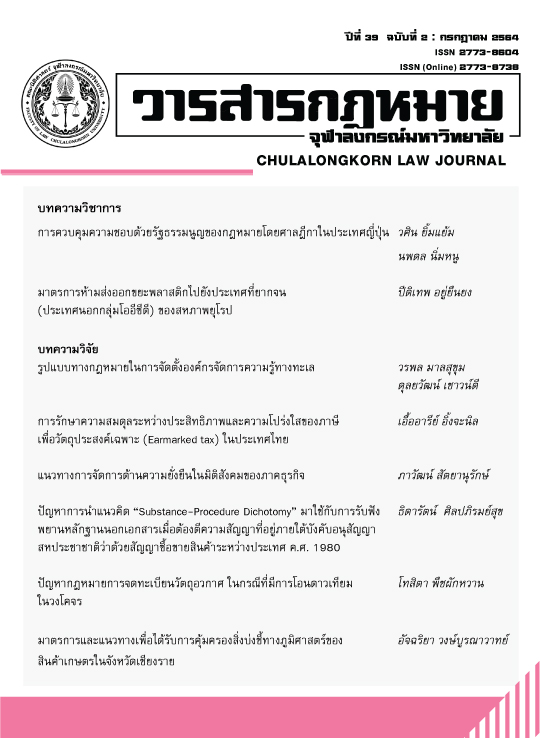การรักษาความสมดุลระหว่างประสิทธิภาพและความโปร่งใสของภาษีเพื่อวัตถุประสงค์เฉพาะ (Earmarked tax) ในประเทศไทย
Main Article Content
บทคัดย่อ
ภาษีเพื่อวัตถุประสงค์เฉพาะ (earmarked tax) เป็นข้อยกเว้นของหลักการพื้นฐานทางงบประมาณ ได้แก่
หลักเอกภาพทางงบประมาณและหลักรายได้ต้องมีลักษณะเป็นการทั่วไป การจัดเก็บภาษีเพื่อวัตถุประสงค์เฉพาะ
มักถูกโต้แย้งถึงความโปร่งใสและขัดแย้งกับวินัยการคลังอยู่เสมอ นอกจากนี้การจัดสรรเงินให้แก่ หน่วยงานเหล่า
นี้ มิได้ผ่านกระบวนการพิจารณาของสภาผู้แทนราษฎรในแต่ละปี เช่น กองทุนสนับสนุนการสร้างเสริมสุขภาพ
(สสส.) อย่างไรก็ดี กองทุนที่มีลักษณะเช่นเดียวกับกองทุนสนับสนุนการสร้างเสริมสุขภาพมี อยู่ด้วยกันหลาย
กองทุน ดังนั้นจึงควรศึกษาถึงความเหมาะสมและความสมดุลของภาษีเพื่อวัตถุประสงค์เฉพาะที่จัดสรรเงินบำรุง
ไปยังกองทุนต่างๆที่เกี่ยวข้อง เพื่อหาแนวทางการบริหารภาษีประเภทดังกล่าวให้มีประสิทธิภาพและมีความโปร่งใส
ต่อไป
Article Details
ลิขสิทธิ์และเนื้อหาในเว็บไซต์ของวารสารกฎหมาย (รวมถึง โดยไม่จำกัดเฉพาะ เนื้อหา รหัสคอมพิวเตอร์ งานศิลป์ ภาพถ่าย รูปภาพ ดนตรีกรรม โสตทัศนวัสดุ) เป็นกรรมสิทธิ์ของวารสารกฎหมาย และผู้ได้รับการโอนสิทธิทุกราย
1. วารสารกฎหมาย ให้อนุญาตให้คุณใช้สิทธิอันไม่เฉพาะเจาะจงที่สามารถถูกถอนเมื่อใดก็ได้ โดยไม่มีค่าใช้จ่าย ในการ
- เยี่ยมชมเว็บไซต์และเอกสารในเว็บไซต์นี้ จากคอมพิวเตอร์หรือเครื่องมือสื่อสารผ่านเว็บบราวเซอร์
- คัดลอกและจัดเก็บเว็บไซต์และเอกสารในเว็บไซต์นี้บนลงคอมพิวเตอร์ของคุณผ่านระบบความจำ cache
- สั่งพิมพ์เอกสารจากเว็บไซต์นี้สำหรับการใช้ส่วนตัวของคุณ
- ผลงานที่ได้รับการตีพิมพ์โดยวารสารกฎหมาย จุฬาลงกรณ์มหาวิทยาลัย ถูกคุ้มครองภายใต้ Creative Commons Attribution 4.0 International License ซึ่งอนุญาตให้ทุกคนสามารถคัดลอก แจกจ่าย ดัดแปลง ส่งต่อ ผลงานได้ ก็ต่อเมื่อผลงานและแหล่งข้อมูลได้รับการอ้างอิงอย่างเหมาะสม
2. วารสารกฎหมาย จุฬาลงกรณ์มหาวิทยาลัย สงวนสิทธิ์ไม่อนุญาตให้คุณใช้สิทธิอื่นใดที่เกี่ยวข้องกับเว็บไซต์และเอกสารบนเว็บไซต์นี้ เช่น การคัดลอก ดัดแปลง เปลี่ยนแปลง ส่งต่อ ตีพิมพ์ แจกจ่าย เผยแพร่ จัดแสดงในที่สาธารณะ ไม่ว่าจะในรูปแบบใดก็ตาม ซึ่งเว็บไซต์หรือเอกสารบนเว็บไซต์ โดยไม่อ้างอิงถึงแหล่งข้อมูลหรือโดยไม่ได้รับอนุญาตเป็นลายลักษณ์อักษรจากวารสารกฎหมาย จุฬาลงกรณ์มหาวิทยาลัย
3. คุณอาจขออนุญาตที่จะใช้เอกสารอันมีลิขสิทธิ์บนเว็บไซต์นี้โดยการเขียนอีเมลล์มายัง journal@law.chula.ac.th
4. วารสารกฎหมาย จุฬาลงกรณ์มหาวิทยาลัย เข้มงวดกับการคุ้มครองลิขสิทธิ์อย่างมาก หากวารสารกฎหมาย จุฬาลงกรณ์มหาวิทยาลัยพบว่าคุณได้ใช้เอกสารอันมีลิขสิทธิ์บนเว็บไซต์นี้โดยไม่ถูกต้องตามการอนุญาตให้ใช้สิทธิ ดังที่กล่าวไปข้างต้น วารสารกฎหมาย จุฬาลงกรณ์มหาวิทยาลัยอาจดำเนินคดีตามกฎหมายต่อคุณได้ เพื่อเรียกร้องค่าเสียหายที่เป็นตัวเงินและคำขอชั่วคราวให้คุณหยุดการใช้เอกสารดังกล่าว ทั้งนี้ คุณอาจถูกสั่งให้ชดใช้ค่าใช้จ่ายใดๆ ที่เกี่ยวข้องกับการดำเนินการตามกฎหมายนี้
หากคุณพบเห็นการใช้เอกสารอันมีลิขสิทธิ์ของวารสารกฎหมาย จุฬาลงกรณ์มหาวิทยาลัย ที่ขัดหรืออาจขัดต่อการอนุญาตให้ใช้สิทธิดังที่ได้กล่าวไปข้างต้น โดยเชื่อว่าได้ละเมิดลิขสิทธิ์ของคุณหรือของผู้อื่น สามารถร้องเรียนมาได้ที่ journal@law.chula.ac.th
เอกสารอ้างอิง
2. Resource revenue earmarking: Comparative analysis and lessons learned, Policy dialogue on natural resource-bases development,p.5, (Online) Available from https://www.oecd.org/dev/inclusivesocietiesanddevelopment/Session-6-Report-on-Earmarking-Practices.pdf.
3. สมคิด เลิศไพฑูรย์, คำอธิบายกฎหมายการคลัง, กรุงเทพฯ : นิติธรรม, พิมพ์ครั้งที่ 3, 2541, หน้า 90.
4. Bryn Welham, Edward Hedger and Philipp Krause, Linkages between public sector revenues and expenditures in developing countries, Shaping policy for development, june 2015, p.15. (Online) Available from https://www.odi.org/sites/odi.org.uk/files/odi-assets/publications-opinion-files/9675.pdf.
5. Fabian Society, Paying for progress: A new politics of tax for public spending, Fabian Society, 2000, p. 150.


